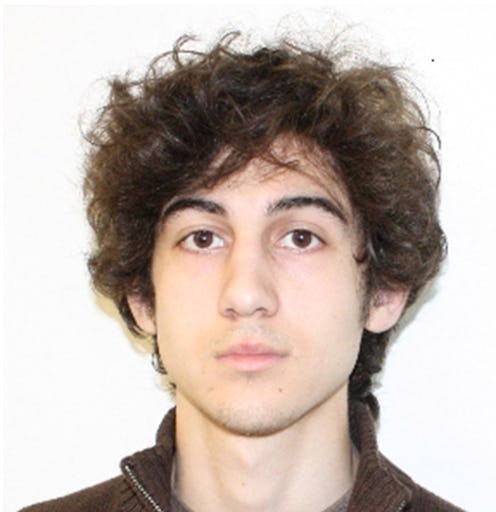News
Was Dzhokhar Tsarnaev's Apology Sincere?
Dzhokhar Tsarnaev, the 21-year-old man found guilty of the 2013 Boston Marathon bombing, finally broke his silence today at his official sentencing hearing. Tsarnaev had never spoken publicly about his actions, not even during his 10-week trial that culminated with a guilty verdict in May. On Wednesday, just before a judge officially sentenced him to death by execution, Tsarnaev apologized to his victims and their families — and you can only hope the apology was sincere.
In the hearing, Tsarnaev's victims and their family members testified one after another, sharing their stories of recovery and airing their grievances with Tsarnaev. "I would like Dzhokhar Tsarnaev to know that he did not break me," said Heather Abbott, who lost her left leg below the knee in the bombing. "I know life is hard, but the choices that you made were despicable," said Patricia Campbell, whose daughter was killed in the bombing.
Perhaps the most shocking statements came from Tsarnaev himself. Up until this point, his only public communication consisted of a so-called "manifesto" scribbled onto the side of the boat that he hid in during a police manhunt. He also flipped off a surveillance camera in his holding cell near the end of his trial in April. In court on Wednesday, he took an about-face by apologizing for what he had done.
I am sorry for the lives that I have taken, for the suffering that I have caused you, for the damage, the irreparable damage.
During the trial, Catholic nun Sister Helen Prejean testified Tsarnaev seemed genuinely sorry for his actions, but the defendant himself remained stoic and distant through most of the proceedings. His apology Wednesday seems to confirm Sister Prejean's perspective, but without video footage from inside the courtroom, the only clues we have about Tsarnaev's demeanor come from sketches and testimonials, which reveal a less convincing story.
Courtroom sketches like the one above show Tsarnaev appeared with the same disheveled hair and unshaven face as he had in previous court appearances. He reportedly looked downward most of the time, making eye contact with the victims and their families infrequently. According to CNN, Tsarnaev spoke in a "low, slightly accented voice," which could suggest he wasn't overly proud of his actions. (Although, it could also suggest he wasn't overly proud of the apology.)
Those who were in the courtroom have given mixed reports of Tsarnaev's demeanor. Some believed his apology, while others found it insincere and offensive. In a press conference following the hearing, Lynn Julian, a bombing survivor, described Tsarnaev's statement as an "Oscar-type speech."
He went on to give a sort-of Oscar-type speech, thanking the judge and thanking the jury and thanking his legal team and thanking those who couldn't be here and his family for testifying and making, and I quote, 'making my life easy for the past two years.'
On the other hand, Henry Borgard, another bombing survivor, found the apology acceptable. He told reporters that he briefly locked eyes with Tsarnaev and suggested that he could forgive Tsarnaev.
I do know that I believe in second chances. The man, the boy who planted that bomb that blew up in front of me is younger than I am.
Whether the apology was sincere or not, Tsarnaev seems to have remained expectedly stoic for much of the hearing, even while Judge George O'Toole formally condemned him to death. During his trial, an overwhelming majority of jurors found Tsarnaev devoid of remorse for his actions. We may never know for sure if he feels genuine remorse, but we will most likely continue to hear about him anyway. A death-penalty verdict carries an automatic appeal to a higher federal court, which means he could wait on death row for years before potentially being executed.
